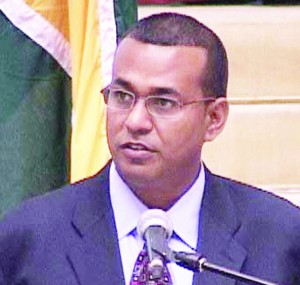
Minister Robert Persaud
The phasing out and eventual banning of mercury, which is expected to take effect in 2022, will not have a severe impact on small miners and their operations. This is according to Natural Resources and Environment Minister Robert Persaud.
The government, through the Natural Resources Ministry, recently signed onto the Minamata Convention on mercury, a new international pact to control mercury emissions and gradually phase out its use.
Prior to the signing, local small miners had been nervous about plans to ban the dangerous chemical, stating that there is no immediate and cheaper way to recover gold from its ore.
However, government has actively been encouraging miners to reduce their use of mercury, which poses long-term health and environmental risks. Speaking to media operatives on Tuesday, Persaud said the phase-out will not have a harsh impact, since “this is not an immediate ban… but rather what the convention requires the country to do is to develop a national action plan to reduce its use and to ensure its safe handling and eventually the phasing out of it in the sector”.
Furthermore, he posited that the government did not see the ban having any impact on the mining sector, highlighting that it can only lead to positive benefits for the economy.
Transitioning
Persaud said the ministry has started a programme of transitioning, pointing out that several mining operations have transitioned to mercury-free mining.
“Those establishments and mining operations in Guyana who have transitioned are reporting recovery in the vicinity of 96 percent to 97 percent… this means for every ounce of gold extracted with the use of mercury, two ounces are left in the ground because of inefficiency.”
He added that as part of the convention, there will be no new mercury mining, but countries that are already engaged in such will be given 20 years after the convention comes into practice to stop producing mercury.
“Over time, it will perhaps be scarce and then not be available globally, because the convention requires some level of restriction on its trading.”
Persaud, who signed the convention in Japan last week, was accompanied by the acting commissioner of the Guyana Geology and Mines Commission, Rickford Vieira. At the event, Persaud stated that government has also said Guyana would need financial and technical assistance to achieve compliance.
The Japan government has pledged its support to Guyana in the phasing-out of mercury use. It is planning to provide US$2 billion in financial assistance to fight mercury pollution. Between 2013 and 2022, Guyana will impose restrictions against mercury importation and mercury in mining.
This approach has been supported by the Guyana Gold and Diamond Miners’ Association (GGDMA), while discussions were held with Amerindian and riverine communities.



